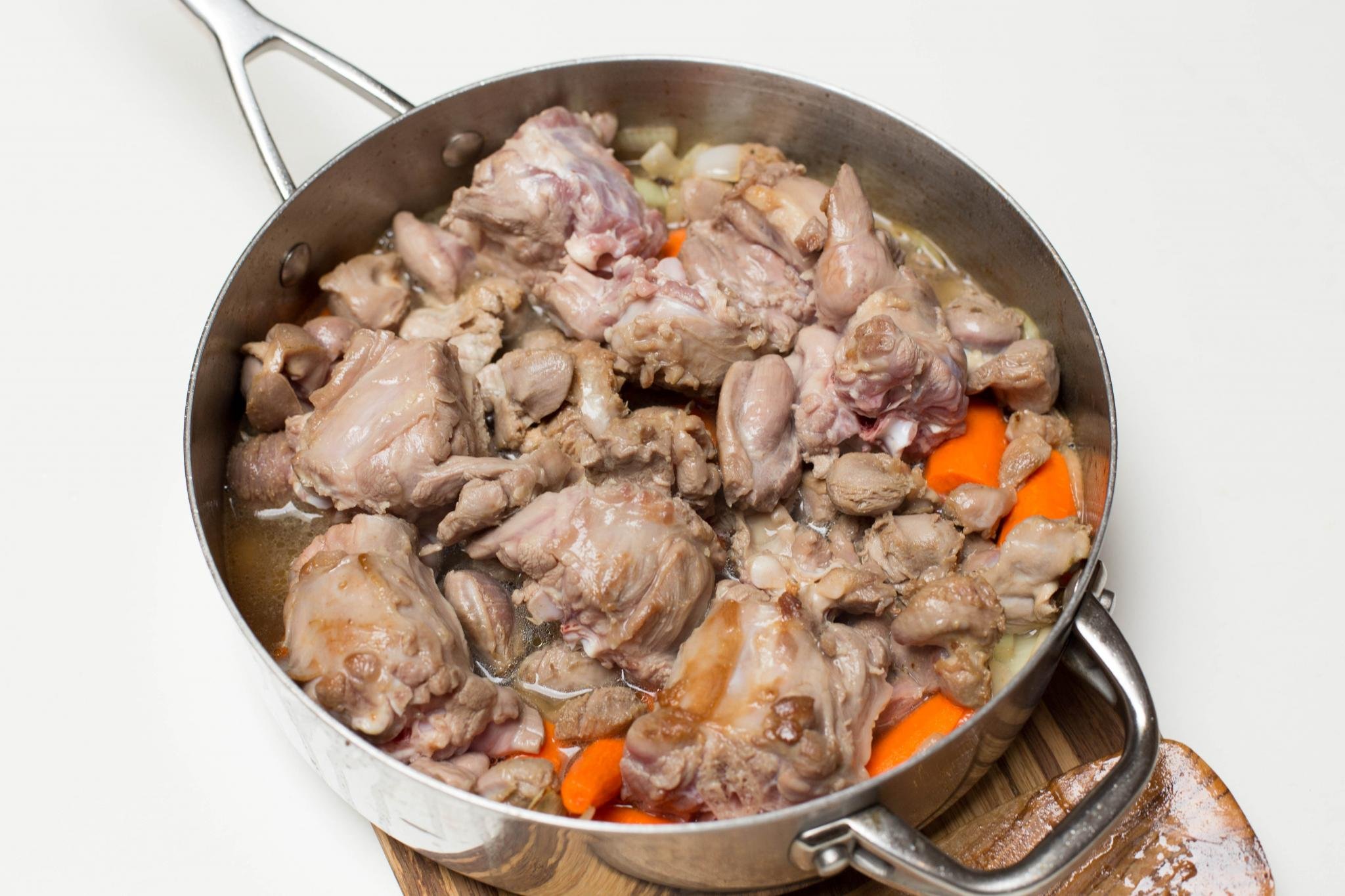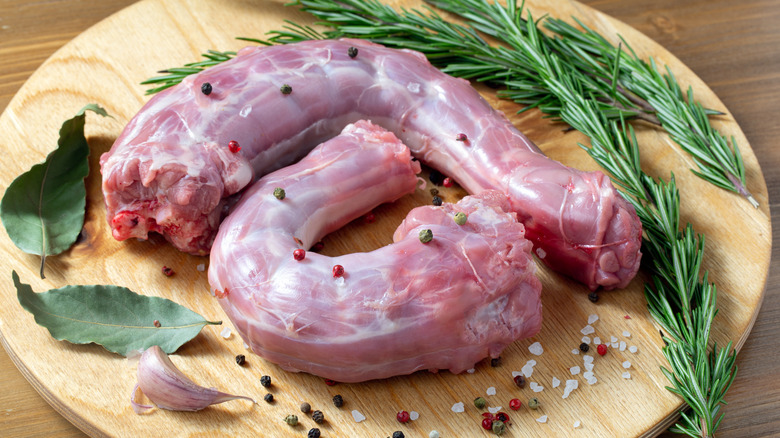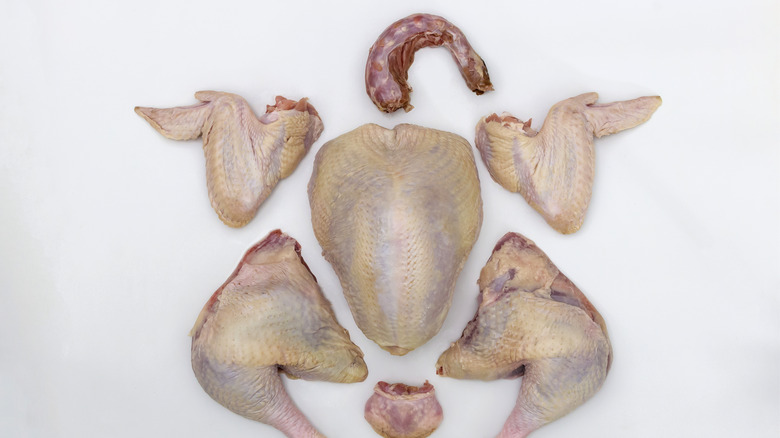Turkeys are big birds that yield a lot of meat, which is great for celebrations and large crowds. But theres more to a turkey than breast meat, thighs, and drumsticks — some of the most tender, succulent dark meat comes from the turkey neck, which you might be tossing away when preparing the bird to roast.
Turkey necks are an often overlooked and underrated gem in the world of poultry. While they might not be the first thing that comes to mind when you think of turkey, necks are a treasure trove of flavor. Packed with succulent meat and rich in collagen, they are perfect for making savory stocks, broths, and soups. The meat on turkey necks is also exceptionally tender, with a texture that practically falls off the bone when cooked properly. When simmered with aromatic vegetables and herbs, turkey necks release a deep, savory essence that can serve as the foundation for amazing gravies and sauces.
Turkey necks are an underappreciated cut of meat that often get overlooked. However, they are packed with nutrients and offer several health benefits. In this comprehensive guide, we’ll explore why you should consider adding turkey necks to your diet
An Overview of Turkey Necks
Turkey necks come from the neck of the turkey. They contain meat, skin, cartilage, and bone. The meat is dark and flavorful. Turkey necks can be purchased fresh or frozen and are inexpensive.
While not the most popular cut of turkey, necks deserve more attention They contain substantial amounts of protein, vitamins, minerals, and other beneficial nutrients. Let’s look at some of the top nutrients found in turkey necks
Top Nutrients in Turkey Necks
Protein
Turkey necks are an excellent source of protein. A 3 oz serving of turkey neck meat contains around 22 grams of protein. Protein provides amino acids that are the building blocks for muscles, bone, cartilage, skin, hair, and more. Consuming adequate protein is crucial for growth, development, and maintaining tissues.
B Vitamins
Turkey necks provide B vitamins like B3, B6, and B12. These assist with converting food into energy and support nervous system health. B vitamins are water-soluble, so our bodies don’t store them effectively. We need regular intake from food sources.
Iron
Turkey necks deliver a considerable dose of iron Iron enables red blood cells to carry oxygen throughout the body An iron deficiency can cause anemia, fatigue, and weakness.
Zinc
Zinc in turkey necks helps with immune system function, cell growth, wound healing, DNA and protein production.
Selenium
Selenium acts as an antioxidant, protecting cells from damage caused by free radicals. It also supports thyroid hormone production.
Collagen
Turkey necks are full of collagen. Collagen provides structure and flexibility to connective tissues like skin, tendons, cartilage, bones, and blood vessels. Consuming collagen may improve joint health, skin elasticity, and injury recovery.
Potential Health Benefits of Turkey Necks
Due to their stellar nutritional profile, adding turkey necks to your diet offers many potential health perks. Here are some of the key benefits:
Promotes Muscle Growth and Development
The high protein content in turkey necks assists with building and maintaining muscle mass. The protein provides amino acids that build new muscle fibers. This makes turkey necks great for athletes, bodybuilders, and any active individuals trying to gain or preserve muscle.
Strengthens Bones
Turkey necks provide minerals vital for bone health like calcium, phosphorus, magnesium, and zinc. Consuming these essential minerals improves bone mineral density and reduces the risk of fractures and osteoporosis.
Supports Immune Function
Turkey necks contain selenium, zinc, vitamin B6 and other nutrients that boost immune response. This guards against illness and infection.
Aids Injury Recovery
The collagen in turkey necks may help repair damaged connective tissues like ligaments and tendons. Consuming turkey necks supports post-workout muscle recovery too.
Improves Skin Health
Collagen improves skin’s elasticity and hydration, reducing wrinkles and dryness. The zinc in turkey necks also speeds wound closure and skin cell regeneration.
Protects Heart Health
Turkey necks provide B vitamins that help lower homocysteine levels, a risk factor for heart disease. The omega-3 fatty acids promote healthy cholesterol levels too.
Enhances Digestion
Turkey necks are a source of gut-healthy protein and collagen. Collagen can help heal a damaged gut lining and restore proper digestive function. The protein also keeps you full longer.
Regulates Blood Sugar
The protein and collagen in turkey necks help slow the absorption of sugar in the bloodstream. This prevents unhealthy spikes and crashes in blood glucose.
Supports Thyroid Function
Turkey necks contain selenium, an antioxidant that is vital for thyroid hormone production and thyroid gland health.
How to Cook and Serve Turkey Necks
Turkey necks are extremely versatile. Here are some simple ways to cook them:
-
Braise or simmer in broth, wine, or barbecue sauce until tender.
-
Bake in the oven seasoned with spices and herbs.
-
Grill over medium-high heat, basting with sauce.
-
Slow cook in a crockpot with veggies for a nutritious stew.
-
Fry in a skillet until browned and crispy.
-
Add to soups, chilis, rice dishes, pasta sauce.
-
Use in place of or mix with ground meat in recipes.
For the best flavor, brown or blacken the skin before braising, baking or slow cooking. Serve with roasted veggies, rice, cauliflower mash, or sweet potatoes. Use leftovers in sandwiches, salads or tacos.
Tips for Selecting and Storing Turkey Necks
When shopping for turkey necks:
-
Look for plump, meaty necks without tears or blemishes on the skin.
-
Opt for fresh necks whenever possible, but frozen pre-packed necks work too.
-
Estimate about 1 lb of necks per person.
Store fresh necks in the fridge for 2-3 days. Freeze for 3-4 months. Thaw frozen necks in the fridge before using. Rinse necks and pat dry before cooking.
The Bottom Line
Turkey necks provide a concentrated source of protein, vitamins, minerals like iron and zinc, and collagen. Consuming turkey necks regularly promotes muscle growth, stronger bones, improved digestion, better blood sugar control and thyroid function.
Turkey necks make cost-effective, flavorful additions to soups, stews, tacos, salads, and more. Their versatility and stellar nutrition profile make them a wise choice to incorporate into a balanced diet.
So next time you see turkey necks at the store, toss them into your cart. Your body and taste buds will thank you.

How to cook turkey necks

To prepare turkey necks, start by giving them a thorough rinse and a gentle pat dry, ensuring theyre free from any surface impurities. While youre at it, check for any excess flaps of skin or fat, which can be easily trimmed before proceeding. You can slice the necks into smaller segments if youre serving them on the bone, or you can choose to cook them whole, as long as they fit into your pan.
Youll want to lightly season and brown the turkey necks by pan-searing them all around. This step not only enhances their taste but also contributes to the depth of the final dish. Once the necks are golden brown, immerse them in liquid for a slow, low braise, generously flavored with aromatics such as onions and bay leaves. Theyll need to simmer for about an hour; youll know theyre ready when the meat begins to easily flake off the bone. Whether youre cooking the necks to use the meat in another recipe or simply to eat as is, the cooking process is the same if you want them to yield tender, flavorful meat.
What is turkey neck meat?

Exactly as youd expect, turkey neck meat comes from the long tube-shaped neck of a turkey, and youll usually find it tucked inside the whole bird. Made of roughly equal parts meat and bone, it shares a culinary kinship with other bone-adjacent cuts like oxtail, short rib, and shank, boasting a deeper flavor than the white meat of turkey breasts and wings. Unlike those larger muscle groups, turkey neck meat consists of numerous small muscles — once cooked, it transforms into tender, juicy shreds that can be lifted from the bones, making it a versatile addition to a wide range of recipes.
Turkey neck can be used as a shredded addition to beans, soups, and sauteed greens, or served on the bone, smothered in richly flavored sauce. But the culinary magic doesnt end there: The simmering liquid used to cook the turkey neck meat becomes rich bone broth, brimming with nutrients. The broth can be then used for sauces, gravy, and soup with deep turkey essence.
TURKEY NECKS IN THE SOUTH
FAQ
Is turkey neck high in cholesterol?
Is there collagen in turkey necks?
Is turkey better for you than chicken?
Is turkey neck meat fatty?
Is turkey neck meat good for You?
Much like other poultry, turkey neck meat is also a good source of protein and micronutrients. Turkey delivers a range of several B vitamins, including B3 (niacin), B6 (pyridoxine), and B12 (cobalamin), which are crucial for energy metabolism and the health of the nervous system.
What are the health benefits of ground turkey?
Ground turkey has multiple benefits. It is a good source of minerals, and B vitamins, rich in proteins, low in fat and it is lower in calories than common turkey.
Why are turkey necks important?
Turkey necks contain calcium and phosphorus which are essential structural components of teeth and bones. Calcium is also responsible for many other vital bodily functions including hormone secretion, muscle contractions, and normal constriction and dilation of blood vessels.
Are turkey necks safe to eat?
There are several risks associated with feeding Turkey Necks including bacterial contamination, intestinal blockages, constipation, and choking. Turkey necks are a by-product of the meat industry, where welfare standards may vary so try to buy free-range products with animal welfare accreditation (RSPCA, Red Tractor, Soil Association).
